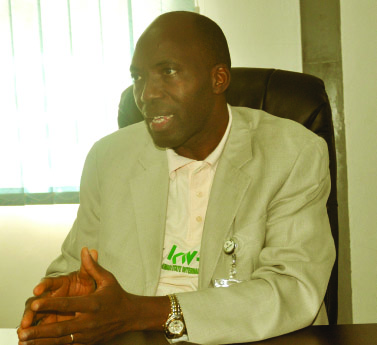Self-bailout Mission: Kwara Launches PRESS To Raise IGR

Many states in Nigeria are gradually failing because of their inability to meet their obligations to the people. They owe workers arrears of salaries without any hope of paying soon, even after the bailout by Federal government.
Kwara State is one of the states that benefitted from the bailout, but today, it is still indebted to its workers. The state owes some category of its workers about four months salary arrears, as well as the 16 local government areas, even after it secured a bank lifeline of about N1.2billlion to pay a month’s salary arrears of its primary and junior secondary school teachers. The situation has thus forced the government to look inward and tax sources are the major focal point for the self-bail out project.
Aside dissolving the former revenue outfit for a new one, the state has also announced a new tax collection strategy, which it tagged PRESS, with which it intends to raise internally generated revenue to N24b yearly.
The new revenue outfit is called Kwara State Internal Revenue Services and is headed by a former Dean, School of Business, Kwara State University (KWASU), Dr. Muritala Awodun.
In a chat with The Guardian, Awodun explained that the revenue outfit’s initial mission would be the blockade of conduit pipes in the state’s IGR system, just as he disclosed that the next step would be the act of growing the state’s IGR. In other words, no additional tax burden would be slammed on the citizens, but there would be a cleverer and computerised tax collection system.
Already, sensitisation of citizens has commenced, just as major stakeholders’ views have been gathered in support of the drive aimed at removing the state’s economy from the doldrums. The works of Awodun and his team have been backed with an extant law signed and sealed on June 22, 2015 by the state governor.
Said Awodun: “As a new body, we have been removed from the civil service structure, and we now report directly to the Governor. We mobilise revenue collection and ensure that we maintain the state government’s integrity, even while carrying out our duties. Besides, we advise the state government on its economic and social policies to bring development to the state. We are expected to collect tax, rates and levies. We are also to generate revenue and guide government through policies that will foster the much-needed development. Therefore, we have brought all these together as a vision to effectively mobilise revenue for strategic development of Kwara State.
“We recognise that we won’t be able to realise our vision without an appropriate strategy. We, therefore, believe we should know the people we serve and how best they want to be served. We are adopting a strategy called PRESS in our revenue drive.
According to him, ‘P’ stands for patronising and persuading. “We realise that Kwara residents’ past expectations have not been met. So, they would need to be persuaded to see that what we want to do now is the best for the state’s economy. ‘R’ means recruit and raise support from the various stakeholders. This means that the people who matter in the society must be brought together to support it. Therefore, the Emirs, Kabiyesis, Etsus, major industrialists, executives of trade unions and associations must give their supports to make a success out of it.
Continuing, he said, “E represents the need to elicit support and energise our various categories of staff. We realise that they will face initial resistance from the people. We need to let them know they must endure. As it is now, we sometimes bring them to the corporate head office in Ilorin, to re-energise them and key them into the vision. The ‘S’ is used for selection and staffing. Here, we use objective processes to recruit staff, which are the best for the job. We recruit graduates with a baseline of at least second-class lower. They must have sound knowledge of computer application because we want to drive the vision with technology. No staff with third class is in our employment, unless such has additional professional qualifications.
“The last ‘S’ is sequencing and systematic reporting method we called 10 raise to power 3. It is a four-year appointment, although renewable for a second term running. We, therefore, have only 1,000 working days. Our target is 1,000 days and what we would have been able to do on daily basis. The heads of departments (HODs) will report to me every 10 working days, while I account to the Governor on a 100-day basis. Every staff will account for the 1,000 daily working days. We all have to mark our days.”
Cloud Tag: What's trending
Click on a word/phrase to read more about it.
MATTA Girls Foundation Olabimpe Olani Dumagi Saka Onimago Ibrahim Sulu Gambari Rotimi Oyedepo Usman Rifun Jimoh Lambe Abdulkareem Tunde Idiagbon Road 08001000100 Kamoru Kadiri Zulkifli Ibraheem Ilorin Airport Magaji Are Nigerian Supreme Council For Islamic Affairs Bolakale Ayo Abraysports FC Kayode Yusuf John Olobayo Alaiye Women For Change And Development Initiative Post-utme Abdulkadir Jimoh Unilorin Omotoso Musa Ilorin South Ilorin Emirate Abdulmutalib Shittu Ethical College Sulyman Age AbdulKareem Bayo Ajia Ashiru Yoruba Yahaya Jibril Usman Elerin Of Adanla Irese Abdulrasheed Lafia Bayo Ojo Ajeigbe Lawal Arinola Kudirat Arinola Lawal ARMTI Taiwo Joseph Jelili Yusuf Shola Odetundun Shuaibu Yaman Abdullahi Ministry Of Women Affairs And Social Development Okin Group Crystal Corner Shops Makama Of Kaiama IF-K Omupo Ibrahim Abikan Ibrahim Taiwo Road Coalition Of Kwara North Groups Sulaiman Gado Ejidongari Kayode Oyin Zubair Baba-Isale Saadatu Modibbo-Kawu Aso Ofi NIPOGA Okala Baba Hassan Oyeleke Kayode Oyin-Zubair Rebecca Bake Shururat Olatinwo IYA YUSUF Niyi Osundare Otunba Taiwo Joseph Mazars Consulting Ishaq Abdulkarim Atiku Abubakar Valsolar Consultoria NIRSAL Aliyu U. Tilde Osinbajo ER-KANG Mining Nigeria Company Limited


